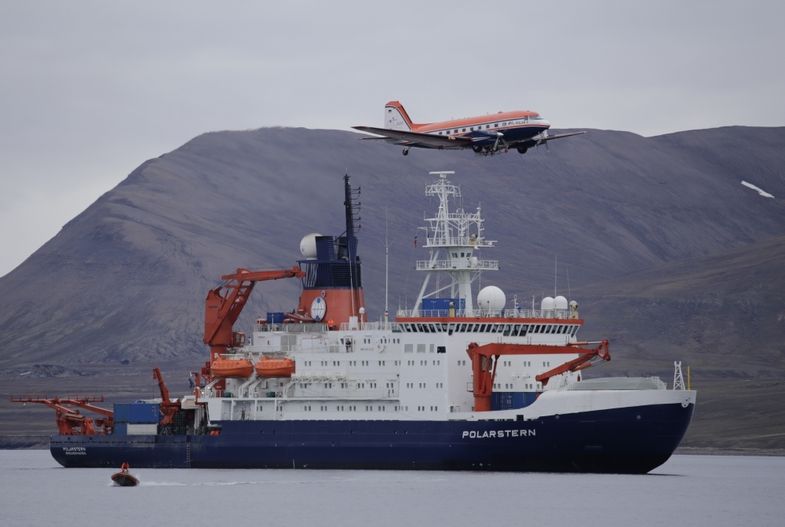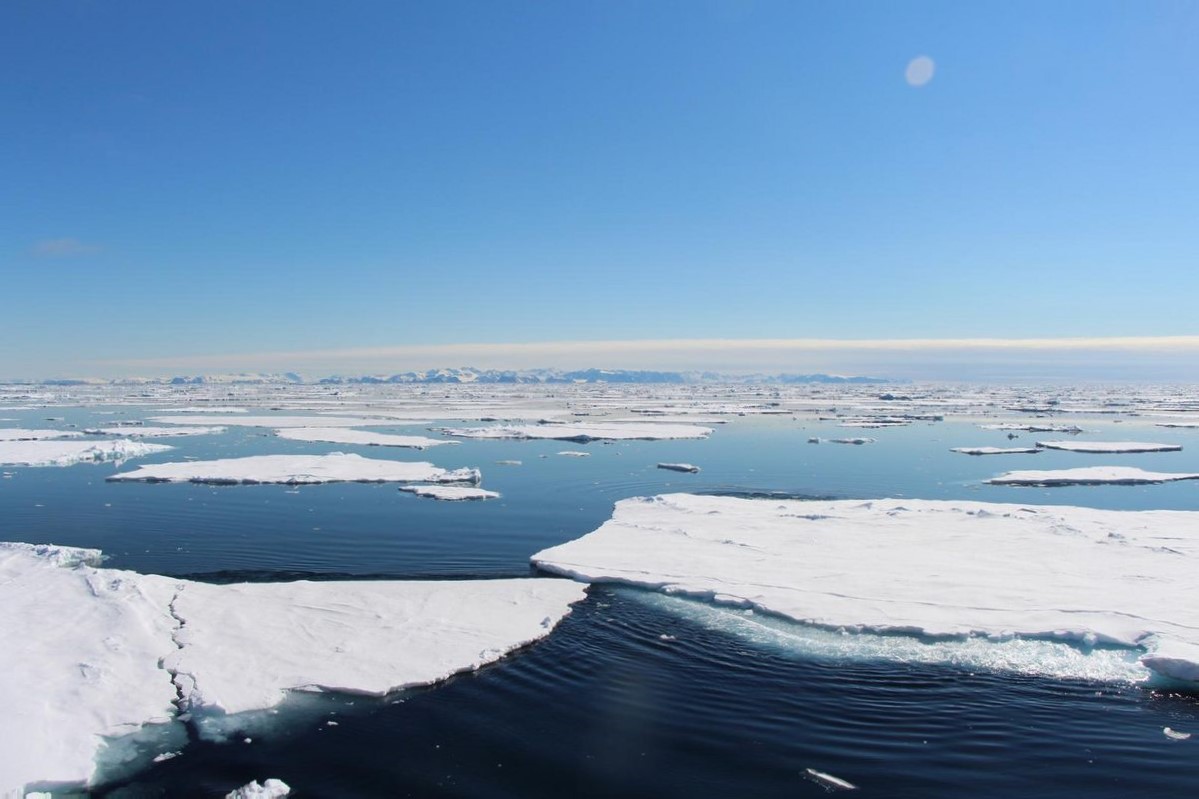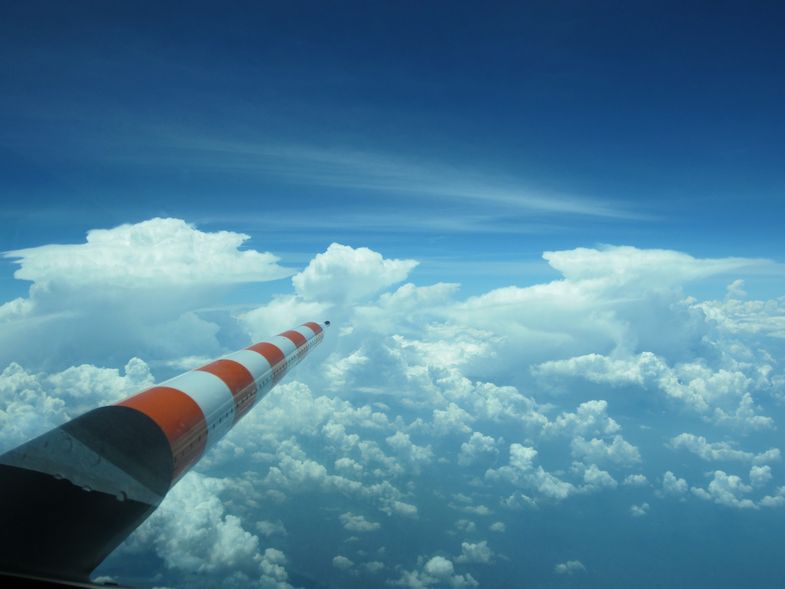The research at the Leipzig university has a long tradition and goes back to the 19th century. Today, about 70 scientists are working at the Leipzig institute of meteorology. Organized in six professorships, we investigate versatile processes which are related to atmospheric changes.
Research Profile
We use climate and weather models and apply versatile measurement techniques to study processes which govern the weather and climate in the troposphere but also in the middle and upper atmosphere.
Our joint goal is a better understanding of the effects and processes of climate change, particularly in the Arctic region. Observational data from satellite-based, airborne and ground-based measurements are taken into account in our studies. We participate actively in national and international field experiments with instrumentation for passive and active remote sensing, and in situ measurements.
Regionally, close cooperations are maintained between our institute and:
- Leibniz-Institute for Tropospheric Research (TROPOS),
- Helmholtz-Centre for Environmental Research (UFZ), and
- Deutscher Wetterdienst (DWD).
Research Focuses
Our working groups work on our research focuses according to the working group-specific thematic orientation.
They pursue the common goal of understanding the effects of climate change especially in the Arctic.
Head: Prof. Dr. Manfred Wendisch
- Role of clouds and surface properties for Arctic Amplification
- Interactions of radiative energy fluxes and cloud evolution
- Identification and effects of phase transitions in clouds
- Improvement of passive remote sensing - spectral and directional
Head: Prof. Dr. Christoph Jacobi
- Arctic Amplification
- Global Climate Change
- Dynamics of the thermosphere/ionosphere system
- Coupling processes of atmospheric layers
Head: Prof. Dr. Johannes Quaas
- Arctic amplification
- Interaction climate- and biodiversity change
- Parameterisation of cloud processes in climate models
- Satellite observations
- Global climate change
Head: Jun.-Prof. Dr. Heike Kalesse-Los
- Arctic amplification
- Microphysics, dynamics, and radiative impact of clouds
- Synergystic profiling with remote sensing instruments for atmospheric research
- Atmospheric retrieval algorithm development
- Precipitation formation pathways
- Evaporation and sublimation of precipitation
- terrain
- Application of remote sensing observations for the improvement of renewable energy forecasts
- Interdisciplinary studies at the atmosphere-biosphere interface
Head: Dr. Matthias Tesche
-
Aerosol-cloud-precipitation-radiation-interactions (indirect aerosol effects)
-
Quantification of cloud life time
-
Retrieval of concentrations of cloud condensation nuclei and ice nucleating particles form spaceborne lidar measurements
-
Effects of aviation of clouds and climate
- Properties of Polar stratospheric clouds
Head: Dr. Maximilian Maahn
- the characterization of the spatial variability of Arctic mixed-phase clouds; and
- a better understanding of the riming process.
Head: JP Dr. Merlene Kretschmer
The motivation of our research is to understand climate risks and reduce uncertainties in regional predictions and projections of extreme weather and climate events. This requires an improved causal understanding of the physical drivers and consequences of extreme events. Our research includes several sub-aspects:
- Detection and Attribution
- Teleconnections
- Predicions
- Casual Data science
Head: JP Dr. Sebastian Sippel
- Detection, attribution, and understanding of forced climate change and climate variability at global and regional scale
- Water and carbon cycling under climate variability and extremes, and their interactions
- Data Science and statistical learning for meteorology, climate and Earth system science
- Data diagnostics and model evaluation
Research Projects
Our institute is coordinating two national collaborative research projects and we are further involved in a number of national and international projects.
- DFG-Transregional Collaborative Research Centre TR 172 : Arctic Amplification: Climate relevant Atmospheric and surfaCe processes and feedback mechanisms (AC)3
- DFG-Priority Programme SPP 1294: Atmosphere and earthsystem research with the research aircraft HALO (High Altitude and Long Range Research Aircraft)
- DFG-Priority Programme SPP 2115 „PROM"
- DFG-Research Unit „VOLiMPACT"
- EU-Research Programme „FORCeS"
- EU-Research Programme „CONSTRAIN"
- EU-Research Programme „ACACIA”
- Marie Curie Innovative Training Network „iMIRACLI”
- BMBF-Project „ClimXtreme”
- BMBF-Project „AtMoDat”
- BMBF-Project „CHANCE"
- BMBF-Project „MAMiP"
- Elucidating the role of clouds-circulation coupling in climate (EUREC4A)
- Dynamics, Aersosol, Cloud and Preciption Observations in the Pristine Environemt of the Soutern Ocean (DACAPO-PESO)
- Multidisciplinary drifting Observatory for the Study of Arctic Climate (MOSAiC)
We are further involved in a number of smaller research projects which are funded by the German Research Foundation (DFG), the Federal Minestry of Education and Research (BMBF), the European Union (EU), and the German Academic Exchange Service (DAAD):
- Working group Atmospheric Radiation
- Working group Meteorology of the Middle and Upper Atmosphere
- Working group Clouds and Global Climate
- Working group Remote Sensing and Arctic Climate System
- Working group Aerosols and Clouds
- Working group clouD and pRecipitation Observations for Process Studies (drOPS)
- Working group Climate Causality
- Working group Climate Attribution


